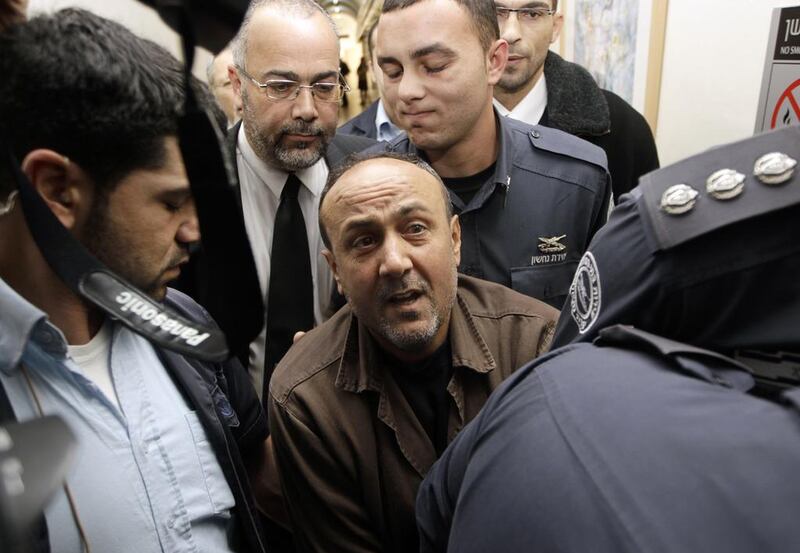RAMALLAH // A prominent Palestinian uprising leader imprisoned by Israel could soon emerge as the key to keeping fragile US-led peace efforts alive.
According to several top officials, the Palestinians are seeking the release of Marwan Barghouti, who is serving multiple life sentences for his alleged role in killings of Israelis, as part of any plan to extend negotiations with Israel beyond an April deadline.
Israel agreed to release 104 long-serving Palestian prisoners in four stages under the terms for resuming the peace talks. The fourth and final stage was scheduled to take place by the end of this month.
The release of Barghouti, 54, a popular figure among Palestinians, could inject new life into the troubled peace process, provide a boost to the embattled Palestinian president Mahmoud Abbas, and even provide the Palestinians with a plausible successor to their 78-year-old leader.
But Israel seems unlikely to approve the request, setting the stage for a possible breakdown in the talks.
The Palestinians have two demands for an extension: a freeze in Israeli settlement construction in the West Bank and east Jerusalem and the release of the most senior prisoners held by Israel, first and foremost Barghouti, said Palestinian senior official Nabil Shaath and the prisoner affairs minister, Issa Qaraqi.
With Israel not expected to halt settlement construction, the Palestinians say they will drive a tough bargain on the prisoner issue. Palestinian officials and Barghouti’s family said Mr Abbas raised the issue of Barghouti’s release in his White House meeting this week with President Barack Obama.
“President Abbas demanded the release of the political leaders in jail like Marwan Barghouti, Ahmad Saadat and Fuad Shobaki,” said Mr Qaraqi.
Barghouti’s wife, Fadwa, said Mr Abbas is “exerting his efforts to release Marwan and he is very serious about it”.
Israeli officials speaking on condition of anonymity said the matter had not yet been raised in talks.
Saadat heads a faction that killed an Israeli cabinet minister in 2001 and is serving a 30-year sentence for allegedly participating in attacks. Shobaki, a former top Palestinian official, is the alleged mastermind of an attempt to smuggle in a large shipment of weapons on a ship that was intercepted by Israeli naval commandos in 2002.
But no prisoner is more prized by the Palestinians than Barghouti, who was a rising star in the dominant Fatah party before he was captured by Israeli troops in 2002. Israel says Barghouti was a leader of the violent uprising in the West Bank early in the last decade. He is serving five life terms for alleged involvement in the deaths of four Israelis and a Greek monk.
The Palestinians say Barghouti is a politician who had no direct involvement in any of the killings.
Barghouti’s release could be critical for Mr Abbas. The Palestinian leader has seen his popularity plummet due to the lack of progress in peace talks. Winning Barghouti’s freedom would be a huge moral victory for him.
And at almost 79, Abbas has recently acknowledged he cannot serve forever. Yet he has never designated a successor and is facing a rising challenge by an exiled former aide, Mohammed Dahlan. Barghouti is perhaps the only member of Fatah’s next generation of leaders with the gravitas to confront that challenge.
Palestinian analyst Hani Al Masri said Mr Abbas desperately needed Barghouti’s release, both to justify continued talks with Israel and to finally have a clear successor.
The fate of the roughly 5,000 prisoners held by Israel is deeply emotional in Palestinian society. Virtually every Palestinian has a friend or relative who has served time in Israel, and the prisoners are revered as freedom fighters.
But the issue is equally emotional for Israelis, who see prisoners like Barghouti as terrorists.
The previous three prisoner releases since the peace talks began, including dozens of men who were convicted in deadly attacks, have been accompanied by jubilant celebrations by Palestinians and attended by Mr Abbas himself, angering many in Israel. On Tuesday, Israel’s chief peace negotiator said the final release was not guaranteed unless there was progress in the talks.
For that reason, the release of Barghouti could become a contentious issue in the coming weeks. Israeli officials have rejected repeated attempts to include him in past prisoner releases.
Still, Israel could be tempted. During the peace talks of the 1990s, Barghouti was generally liked by the Israelis, had many friends among them, and was considered a moderate interlocutor. With many Israelis concerned that Mr Abbas will be followed by more radical nationalists or Islamists, a Barghouti ascension, despite his supposed actions during the uprising, might not seem like the worst option.
* Associated Press





